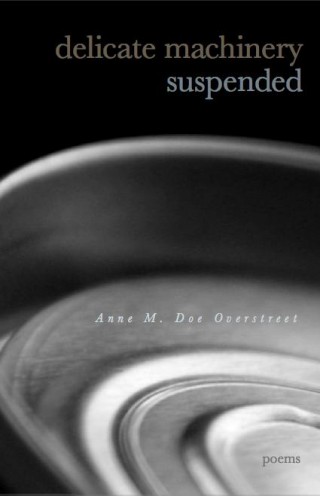Anne Doe Overstreet. Delicate Machinery Suspended. Ossining, NY: T. S. Poetry, 2011.
Anne Overstreet writes poems that mirror their creator: they are honest, intelligent, probing, and understated. Her expansive curiosity and finely tuned ear combine to great effect in this debut collection, Delicate Machinery Suspended. Overstreet shapes her volume into semiautobiographical quartets that point toward profound insights—some hidden, awaiting discovery. From the first section, titled Compass, we join Overstreet as coexplorers through the weave and mesh of her poems.
Each quartet opens with an introduction of the theme in sensual, lyric prose that serves as a gate through which we enter the rest of the section. From Compass we move to Delicate Work; from there, we learn How to Fall. And at the collection’s end, we are all Turning, finding ourselves in sync with the soft movements between prose and poetry:
Some rituals developed by insomniacs seem ridiculously elaborate. We wield them like charms to compel the waking, circadian rhythm to relinquish the field to the night brain. Lavender pillow spray, oil rubbed on the temples, the recorded call of a loon . . . I used to hope for at least the bent clarity that comes to some people at 2 a.m. A kind of ecstatic trance or a moment when inspiration drags herself through the subconscious, sends a poet stumbling through ranks of daffodils . . . there is a kind of compensation that comes at that hour—an acuteness of the senses found at the edge of deprivation. Every footfall coming down the sidewalk is portentous. . . . The forsythia provides a delicate sift of shadow. With a good run of sleep behind me I get cocky. Tonight I intend to sleep under the moon, wooing a measure of madness. I think, maybe tonight, epiphany (45–46, emphasis in original).
There are many epiphanies to be found in this subtle, shimmering volume. From her adolescent memories of blinding heat in Roswell, New Mexico, “where weather is like a stranger approaching from a distance,” to her second-half-of-life identity, draped in the abiding damp of shorelines near Seattle, Overstreet turns a scientific gaze on all manner of weather and on the creatures who inhabit the landscapes of her memories. In the opening poem, “Gathered,” she muses on “bees braiding a path. . . . bees blurring past, softening / into butter” (13).
The poet’s fondness for, and familiarity with, animals is evident in many of the poems in this collection. Horses and dogs figure prominently, as in the serene and lovely “Compline” and in perhaps my favorite poem of all, “Men Who Love the Domed Heads of Old Dogs”: “whose hands like thick pads / polish the half-globe / from white-fringed brow / to nape, those / are the men I love / who move gentle / slowly folding knees” (77).
In “Rental,” we find her calmly resigned to the habits of an old house, where “Dust sifts through floorboard / gaps” and “We’ve learned / to listen to what the stairs say, / for water in the walls, for mice”(19). In the tender poem “Domestic,” the narrator instructs herself, and us, to “Leave the sea, return to this more steadfast table . . . Treat with kindness the hound at your foot, / with reverence spill salt onto the plate”(23).
We find youthful sexual chemistry in “Souffle”—“Because they have collected farm-fresh / eggs from the Saturday market . . . shopping basket bumping the swell of her hip / that he layered beneath his own not hours ago, / he offers to prepare a dish, asks / what she wants and finds himself . . . thinking only of folding one body beneath the other” (76)—but are also introduced to the elderly Crawford who, with arthritic hands, cradles “a seeping globe that encloses the Pyramids of Giza. Like his wife’s breast / and the frayed head of the old retriever.” We read of how he “stretches tendons for the delicate / work of repair, heaven’s dome fixed securely above” (43). Through these details, Overstreet offers glimpses into the sacredness of private lives and ordinary rituals.
But not all is sweetness and light. Overstreet lures us to into the darkly drawn “Preparing for Market,” her 2011 PushCart Prize nominee, a poem that unveils the common, rough flank of ranch life, where nothing is quite as innocent as it appears: “My body draws back into my coat, waiting, for the tooth to slip free. Even as we master / the horses, drive the calves to the knife, / we are paced and watched and worshipped / by dogs still wolf in the mouth. . . . Mars hangs a flaming sword to the East” (34).
With her offbeat humor and great tenderness for those we deem the “Other,” Overstreet describes the ping of alien communication with the cosmos in one breath and a whale carcass resting on the ocean floor in the next. With equal appetite she roams the pastures, plumbs the depths, and listens to the hum of the universe. She places her trust in the delicate machinery of the created world. Like the narrator in “Edges,” “she loves it all—the sharp, / the keen. A green-broke horse under the saddle, / the crooked wound of a lover’s kiss” (72).
Here is a book saturated with reverence for the intricacies of living things, for the connection of bone and sinew, for the fox femur and the severed human limb, the part always suggesting the mystery of the whole. Here is a book where the half-light between waking and dreaming suspends the dreamers, calling us to that thin space between wave and shore. The shore might be a hospital waiting room; the waves could be the flailing heartbeats of one we love. The boundaries blur between interior and exterior space. But always, in the end, the poet quietly leads us to the place where wonder resides and where the Holy speaks.
